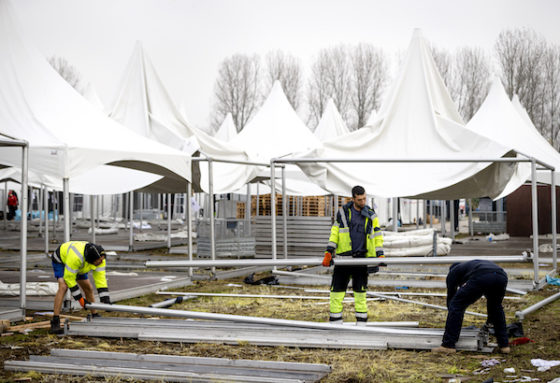Afghan refugees in emergency shelters are increasingly desperate


Afghan evacuees who have been staying in emergency accommodation following their arrival in the Netherlands in August and September, are becoming increasingly desperate about the lack of perspective, broadcaster NOS reports.
Some 2,000 Afghans who assisted the Dutch police forces and NGOs in some way, were brought out of Kabul following the takeover by the Taliban.
Regular Dutch refugee centres are overflowing and many were put up at emergency shelters at Heumensoord (Gelderland), Harskamp (Gelderland), Leeuwarden (Friesland), Zeist (Utrecht), Leersum (Utrecht), Zoutkamp (Groningen) and Almere (Flevoland).
Weeks on, the lack of privacy and uncertainty about the future is driving some to despair.
Representatives of the UN refugee agency who visited the centres at Heumensoord, Harskamp, Zeist and Zoutkamp in September and October, expressed concern about the circumstances the refugees are facing, particularly at Heumensoord were people are living in tents.
Earlier, the national ombudsman and the Dutch human rights committee wrote to junior justice minister Ankie Broekers-Knol to say the tents are ‘completely unsuitable’ for winter.
Waisuddin Akhondzada, one of the first evacuees to arrive in the Netherlands, and who currently lives at the Heumensoord shelter said ‘sleep is impossible’. ‘Everyone is used to taking a sleeping pill at night now,’ he told the broadcaster. ‘The children don’t sleep either and fall asleep in class. There were complaints about that from teachers but by now they know why it happens,’ he said.
Akhondzada, who worked for the Dutch police mission in Afghanistan, said he was grateful to be in the Netherlands but that the lack of perspective was grinding him, and many others, down.
Sayed Ahmad Sadat, who came to the Netherlands last month and who lives at Harskamp said he is worried about the planned closure of the accommodation on December 1.
Sadat said circumstances at other locations may be worse, such as in Leeuwarden, where families and young men sleep in a hall without any privacy at all. ‘One family said they would not go to Leeuwarden under any circumstances. They fear for the safety of their mothers and daughters,’ he said.
Like Akhondzada, Sadat said he wants ‘to learn the language so I can contribute to society. But that is not possible now,’ he told the broadcaster.
Heartrending
A spokeswoman for refuge settlement agency COA said the organisation is aware of the sometimes heartrending experiences of the refugees at some of the locations but said the problem is too complex to solve quickly.
The lack of housing combined with a high influx of refugees and the number of ministries and organisations involved make things very difficult. ‘It would be easy if there was one party to blame but there isn’t,’ she said.
The agency has very little choice when it comes too emergency locations such as Leeuwarden. ‘We want to offer people at least a bed, safety and medical help. In Leeuwarden it had to be a hall and we know it’s not ideal. It’s not as if we like housing people in marquees. But we can only offer what we have.’
Caretaker home affairs minister Kasja Ollongren and junior justice minister Ankie Broekers-Knol said last week the ‘quality and quantity’ of emergency accommodation will remain ‘worrying’ until the end of the year at least.
Thank you for donating to DutchNews.nl.
We could not provide the Dutch News service, and keep it free of charge, without the generous support of our readers. Your donations allow us to report on issues you tell us matter, and provide you with a summary of the most important Dutch news each day.
Make a donation